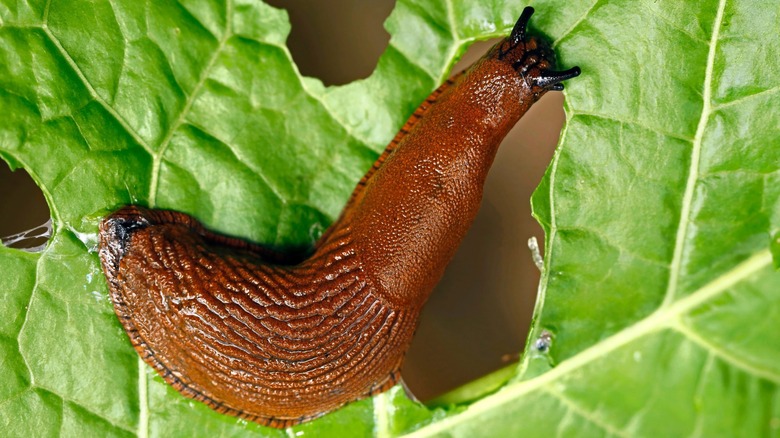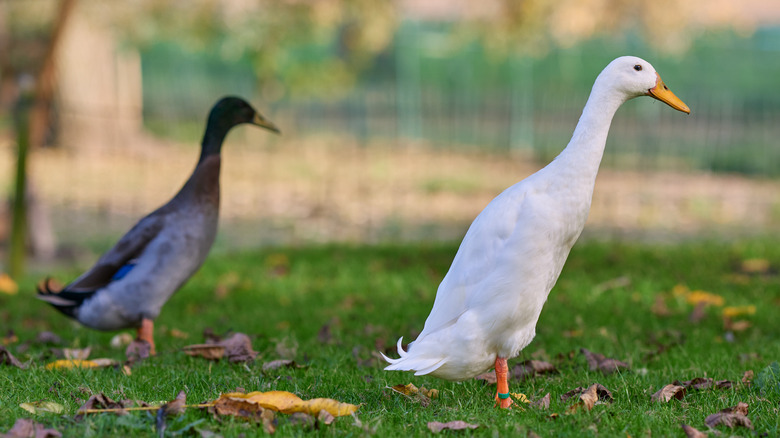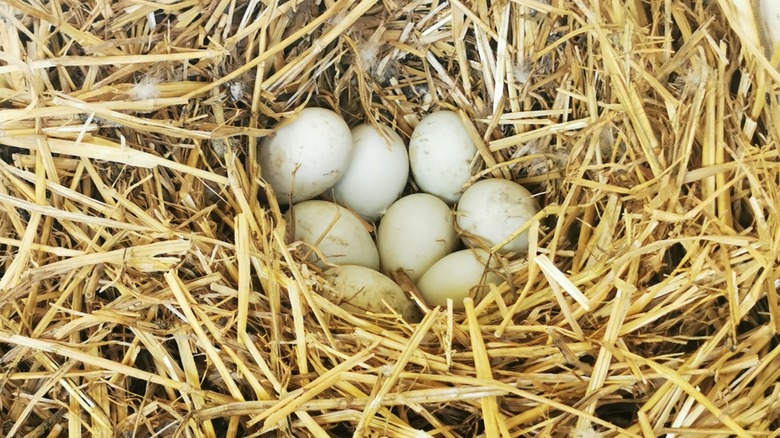These Adorable Birds Could Be The Answer To Your Slug Problem
Gardening — at its core — is a delicate and deliberate ecological balancing act. No grouping of plants exists in a vacuum. Where there is thriving organic matter, there are living creatures feeding (or attempting to feed) off of that matter. When those creatures cause harm to the plants being intentionally grown in a garden, they are considered pests. Luckily, the garden's ecosystem doesn't end there. Nature has created a creature to feast upon every pest that hopes to eat the plants in your garden. If the worst garden pests in your area happen to be slugs, you're especially in luck. The solution to a slug problem is a particularly cute and whimsical creature: the universally adorable duck.
When you utilize your garden's potential natural balance of predators and pests — like keeping ducks for slug control — you may be able to avoid or reduce the use of chemical pesticides, if you wish to do so. Consider this your gardening guide to utilizing ducks to keeps slugs out of your garden.
How to start controlling your garden's slug population with ducks
The beauty of using ducks to control snails and slugs in the garden is that it doesn't require a gaggle. Gardeners around the web report that just one pair of ducks is enough to defend over a quarter acre of crops, which equates to over 10,000 square feet of garden. According to Greenpal, the average American food garden is 600 square feet. While this suggests that one duck is enough for most gardens, these birds are social creatures and shouldn't be kept in isolation.
When it comes to slug reduction without posing a threat to your plants, the breed of duck used matters. Many duck breeds will eat plants and slugs, so it's important to obtain a breed that prefers slugs over vegetation. Indian Runner ducks fit the bill (no pun intended) and also bond well with humans. As an added bonus, they love to feed on mosquito larvae.
First, you'll need some Indian Runner duck eggs or ducklings either from an online provider like Metzer Farms or a local farmer. You may also be able to find adult ducks for adoption. You'll need an incubator if hatching eggs, being careful to keep the incubator clean and humidified and to rotate the eggs daily. After about a month, your eggs should hatch. Keep the chicks in a box with a heat lamp and feed them chick mash until adult feathers appear. Then, move them outdoors and start feeding them slugs. Before long, they'll hunt for the pests on their own.
The long-term benefits of keeping Indian Runner ducks
Your initial decision to hatch, raise, and keep Indian Runner ducks might be in response to a slug problem in your garden, but that doesn't mean you can't benefit beyond keeping snails and slugs out of your garden. These birds offer much more than a way to reduce your garden's slug and mosquito populations. For starters, Indian Runner ducks are inquisitive and tend not to fear people. This allows you to teach them to hunt for slugs and their inquisitive nature will do the rest.
Once your ducks begin to eat a steady diet of slugs, the females will become capable of producing a relatively large number of eggs. If you also have a male to fertilize them, these eggs can be used to add more ducks to your garden gang or be sold for hatching. They can also be hatched and raised for meat, as the Indian Runner boasts a high meat-to-bone ratio. Unfertilized eggs can be eaten or sold for food. Simply provide your ducks with shelter, a grain mix formulated for ducks, and a pool or pond with water and they will repay the favor by providing natural pest control, eggs, meat, and adorable entertainment for years to come.


